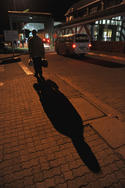The Bedrock on Which Economies are Built
Unskilled labourers migrating between their homes and distant places of work is the bedrock upon which southern Africa’s economies are built. Their pay cheques are often minute and their work back-breaking, but the cash they send home to their families can quite literally feed entire communities. Surprisingly, the urban worker might also be dependent on a rural family back home to ship them food from time to time. It is a vital ebb and flow of resources between the rural headwaters of so much of the city’s labour force and the cityscape that has become their near-permanent new home.
The Lesotho-South Africa Border

Thabiso Qhasane is caught in a moment of elongated time. In spite of the hustling cross-border bustle, he is flattened into a brooding silhouette by the dirty orange spotlight that is glaring down myopically from its perch atop a security lamp post at the Lesotho–South Africa border at Maseru Bridge, which slings itself across the Caledon River.
The light draws an imposing hollowed-out shadow behind the man, three times his size. There is a small travel case hanging from Thabiso’s right hand; in his left hand, a plastic shopping bag, double-knotted at the top, with some food for the road.
Everything around him is industrial, from the monochromatic squiggly bricks beneath his feet and the squared fluorescent whiteness of the windows in the empty customs building, to the multiple taxi headlights strafing the concourse as they work their way up the thinning queue of vehicles that are still crossing over after dark.
Behind them, their brake lights wink angrily as they bolt off towards South Africa, just a hundred metres away. It is a Sunday evening in early April, sometime after nightfall, and these are Thabiso’s last moments on Lesotho soil after his three-week annual leave.
Missing Home
There is still time for the 48-year-old South African-born Basotho to get one of the regular taxis that will ship him away from the country where he has lived since he was two, up to the mines in Gauteng that have swallowed up so much of his adult life.
Like so many of the menfolk of Lesotho, Thabiso is part of the forward and backward movement of the migrant mine workers who have been drawn away from their families in the poverty-stricken mountain kingdom for the past century to eke out a living at the rock faces of the Reef, sending home cash to support the family. What does he miss most about being away from home so much?
Ah! Well, he misses the home-cooked bread, and pap with meat and vegetables. ‘Food that’s cooked in bulk isn’t so nice,’ he says, referring to the industrial-scale cooking on the mine. And motoho. He misses the Basotho drink that his wife makes for him. It is a traditional drink, he explains, more like a thin, soft porridge made from maize meal.
He used to add sugar to it, but he found out last year that he is diabetic (it turned up in a routine medical at the mines), so he does not sweeten it any more. What else does he miss?
Well, his children, of course. And...what does he miss the most? He is quiet for a moment. Chocolate-brown eyes look up and to the side, getting stamped with a distorted reflection of the rectangle of light let in through the open kitchen door across the room from him. What does he miss most? His wife, of course. He misses his wife.
By Leonie Joubert